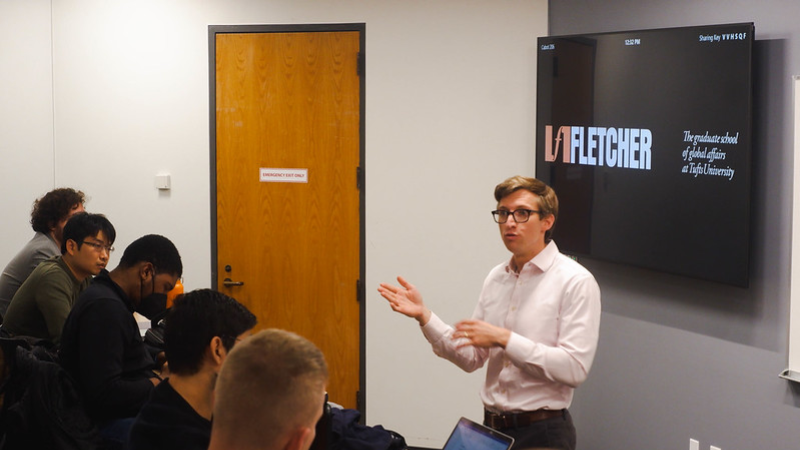
The Impact of Semiconductor Sanctions on Russia
By Chris Miller, Associate Professor of International History at The Fletcher School, and author of Chip War: The Fight for the World’s Most Critical Technology
- Russia’s small and technologically backward chip-making industry continues to function and largely supplies the Russian defense industrial base. Its ongoing reliance on Western spare parts and materials represents a choke point that the West should intensify focus on.
- The West—and especially European and Asian allies—needs tighter enforcement of controls on chip-making tools and equipment to further squeeze Russia’s small domestic chip-making industry.
- Enforcement challenges around semiconductor export controls illustrate the need for a new, multilateral export control regime—including tightened enforcement mechanisms—that includes the US and all its allies.
Introduction
After Russia again invaded Ukraine in February 2022, the US and its allies restricted Russia’s access to semiconductors, aiming to cause disruption to the Kremlin’s defense industrial supply chains. Have these controls on semiconductors worked? The secrecy of the Russian defense industrial base makes it difficult to answer this question fully, but this report examines the evidence to provide some tentative conclusions on the impact of tech export controls.
The chip industry is divided between firms that design chips and firms that manufacture them. Before the war, Russia had three primary sources of semiconductors:
- Western Firms and Distributors of Western Chips. Most chips used in Russia were imported directly from Western firms or from distributors. This trade continues, largely via distributors in China that ignore Western sanctions.
- Russian Designers and Foreign Contract Manufacturers. Russian chip-design firms produced chips largely for government customers, outsourcing their manufacturing to foreign contract manufacturers such as the Taiwan Semiconductor Manufacturing Company (TSMC). This trade was small volume and is now mostly cut off due to sanctions.
- Russian Manufacturers. Russia has a small volume of chip-manufacturing capacity, which largely serves government customers. These firms remain operative and continue to import Western materials for their manufacturing processes.
Since the imposition of sanctions, Russian chip-design firms have lost access to most foreign contract manufacturing. There is a chance that some contract manufacturers in China secretly make chips for Russian customers, in violation of US sanctions, though no evidence has emerged that this is happening. Russia’s chip manufacturers are trying to increase volumes, but this report finds little evidence they are succeeding, probably because export controls limit their access to Western tools and materials.
However, Russia retains broad access to Western chips, which it can buy straightforwardly from China. Such transactions are usually illegal under US law, but the Chinese government has turned a blind eye to this trade. In an early February 2024 meeting, Chinese President Xi Jinping and Russian President Vladimir Putin promised to “maintain the stability” of industrial trade, referring to China’s supply of critical components to Russia’s defense industrial base.1 While Russia smuggles some chips directly from the West or via third countries like Turkey, over 80 percent of the chips Russia has purchased since the start of the war have come directly from China (Figure 4).
Nevertheless, Western sanctions have caused substantial supply-chain issues and price increases. Drawing on customs data analyzed with Natalie Simpson of the Center for Advanced Defense Studies (C4ADS), this report shows that successive rounds of sanctions have forced Russia to pay nearly twice as much for semiconductors as it did before the war. Russia has had to repeatedly establish new supply chains for acquiring chips. Of course, as sanctions disrupt existing smuggling routes, Russia sets up new ones, requiring a regular updating of sanctions to maintain their disruptive impact.
Whack-a-mole is a frustrating game for Western governments to play, but it is almost certainly frustrating for supply-chain managers at Russian missile and drone factories too.
The biggest failure in enforcing the controls is not that Russia continues to have some success in smuggling—that’s not a surprise—but that China continues shamelessly to sell Russia so much via normal trade routes. The Biden administration and European allies have thus far been unwilling to devote political capital to push China to even partially abide by Western restrictions.
So long as China sells Western chips to Russia, the US should impose more frequent sanctions against Russian and Chinese firms involved in the illegal chip trade, with the aim of enhancing the disruptive effect. Russia cannot be fully cut off from access to chips, but the existing controls are probably already causing bottlenecks in Russian defense production. Ramping up enforcement will intensify this effect.
(This post is republished from American Enterprise Institute.)
